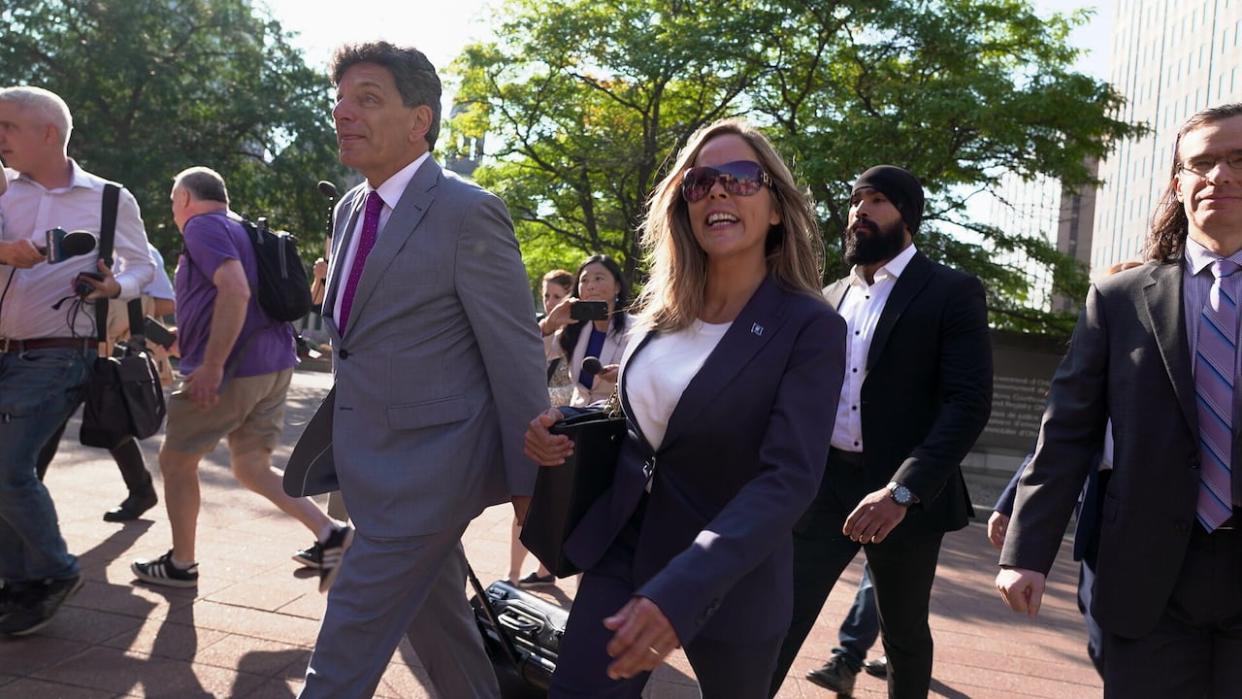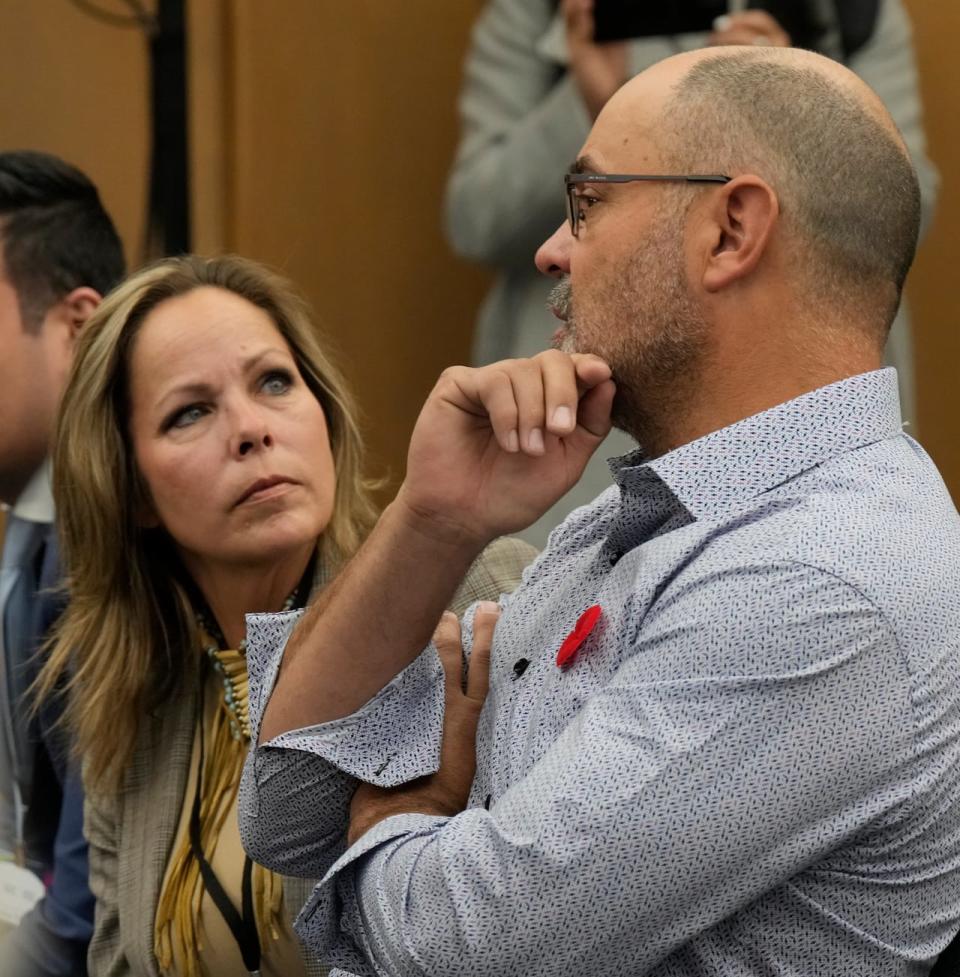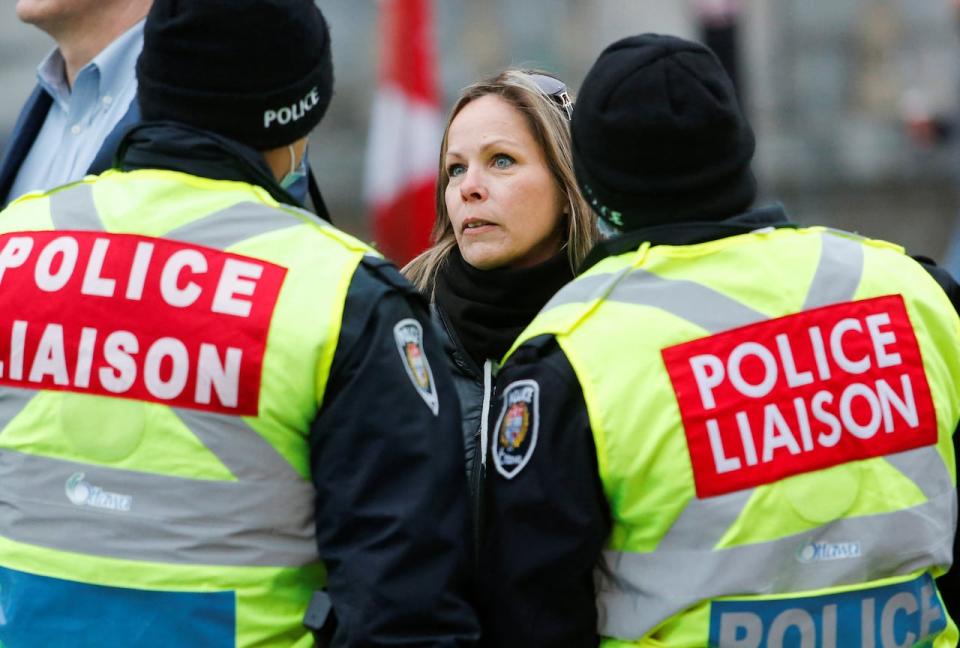'Hold the line' doesn't imply crime, defence says in convoy trial

Lawyers representing two leaders of what became the Freedom Convoy continued defending their clients in an Ottawa courtroom on Tuesday.
Tamara Lich and Chris Barber are on trial for charges of committing mischief, obstructing police, counselling others to commit mischief and intimidation for their roles in the protest.
Eric Granger, one of the lawyers representing Lich, argued the Medicine Hat, Alta., woman's use of the phrase "hold the line" didn't imply she was encouraging criminal activity.
Crown prosecutors used the line to demonstrate she was encouraging people to stay in Ottawa even after police had told protesters to leave.

Lich, left, and Barber speak as they wait for the Public Order Emergency Commission to begin last fall in Ottawa. (Adrian Wyld/The Canadian Press)
Granger said it is "speculative" to suggest the phrase had any nefarious connotation and pointed to evidence showing instances of police using the phrase during the operation to end the protests.
Crown prosecutors argue Barber and Lich worked together in their capacity as leaders of what became the Freedom Convoy and conspired to commit criminal acts when they helped lead demonstrators into downtown Ottawa, where they remained for several weeks and caused significant disruption to residents.
The defence argues Lich and Barber shouldn't be considered co-conspirators because there isn't enough evidence to suggest that's the case, meaning evidence against one should not be used against the other.
Granger pointed to evidence from police witnesses describing how there were many different convoys arriving in Ottawa and it wasn't clear who was, and was not, part of the protest, or affiliated with Lich and Barber's group.
He also pointed to divisions within the protesters using previously entered testimony from police, which suggested some protesters, including a group from Quebec stationed on Rideau Street, were not co-operating with police and other convoy groups.
During Crown submissions earlier in the trial, police witnesses described communicating with several organizers of the protest from several different groups.

Lich, who helped organize the convoy protest in Ottawa, speaks with police liaison officers in February 2022. (Patrick Doyle/Reuters)
No threats of violence, defence says
One officer said there were different "spheres of influence" during the protests and "factions" of people, including some who came to see the spectacle of the protests rather than participate in them.
None of the witness testimony tied Barber or Lich to any illegal acts.
The defence argues Barber and Lich promoted peace throughout the protest and worked with police.
Diane Magas, who's representing Barber, pointed to thousands of pages of text messages between Barber and others leading up to and during the protests entered into evidence by the Crown. She said there are no threats of violence in the texts nor are there suggestions violence should be used as part of the protest.
She said there is no indication Barber came to Ottawa with the purpose of unlawful assembly.
"There's nothing illegal about getting fuel for trucks that are going to protest in Ottawa," Magas said, arguing Barber and Lich were planning a peaceful coast-to-coast protest and telling participants to work with law enforcement.
"There's nothing wrong with people saying they are going to protest until they get what they want. It doesn't mean they're going to get what they want."
The text messages show Barber was communicating with former Saskatchewan premier Brad Wall and a sitting MLA in Saskatchewan about organizing the protest.
Magas also pointed to videos Barber posted to social media before and during the protest where he tells supporters to respect law enforcement.
Police assisting protesters
She chronologically went through a series of text messages and social media posts by Barber where he points to police assisting the protest. In a video posted to social media, he tells viewers Ontario Provincial Police (OPP) officers were escorting trucks as they travelled to Ottawa.
Ottawa police also provided the protesters with maps directing them to go downtown, and helped position trucks on Wellington Street.
Prosecutors have argued Lich and Barber crossed the line into criminal behaviour by using their control and influence over the crowds.
In its court filings the Crown said Lich and Barber, in their capacity as leaders of the protest, "communicated about attending a meeting to discuss strategy to 'gridlock the city.'"
They allege Lich, after police escalated operations to remove people from Ottawa, encouraged others to join the protest, including when she told them to "hold the line."


